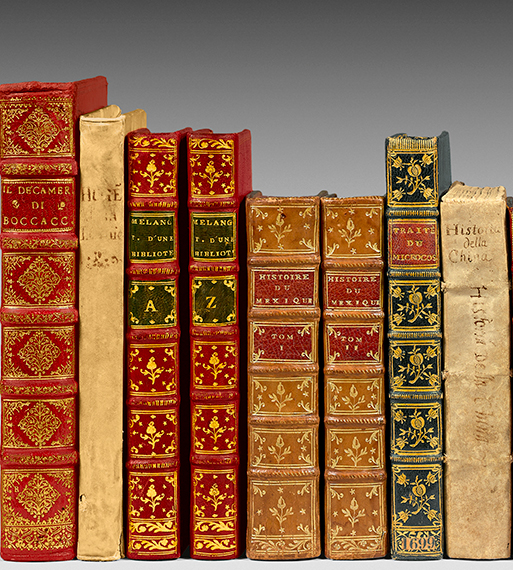Magnificent copy combining two of Bossuet’s major original editionsin their original bindingeby Bossuet.
Bound in red morocco de of the time..
Paris, 1731.
Bossuet. Treatises on Free Will, and Concupiscence. Posthumous Works (given by Jacques-Bénigne, nephew).
Paris, Barthélémy Alix, 1731.
2 parts in 1 volume in-12 of 26 pp., (3) ff. of table, 155 pp., (1) f. bl., (1) title f., 218 pp., (6) ff. Bound in full period red morocco, cold fillet framing the boards, richly decorated raised spine, with fleur-de-lys rolls at the foot, gold fillet on the cuts, gilded roulette inside, gilded edges on marbling. Binding of the period..
168 x 94 mm.
Original edition of two of Bossuet’s major treatises.
Library of Backer, no. 998; Bulletin Morgand and Fatout, no. 129; Rahir, The Library of the amateur, 336; Tchemerzine, I, 905; Brunet, I, 1139.
Bossuet was appointed tutor to the Dauphin in 1670 and the Treatise on Free Will is one of the works composed for the education of the future sovereign.
The subject deals with the ‘means of reconciling our Freedom with the certainty of God’s decrees’.The question of whether there are human choices independent of God’s sovereign grace had just divided French Catholics into two camps: the Jesuits, supported by the high clergy as well as by the King, and the Jansenists of Port-Royal, minority but united around brilliant theological and intellectual authorities such as Arnault and Pascal. Yet the years that saw Bossuet tutor the Dauphin coincide almost exactly with the Peace of the Church of France (1668-1678). Moreover, the Jansenists were among the few people not to clash with Bossuet, even if his position at Court did not allow him to openly show the interest he had in Port-Royal’s theology.
Thus, the richness of the Treatise on Free Will resides mainly in the delicate yet courageous synthesis (it is still to the future King of France that Bossuet addresses himself) of two doctrines nevertheless fiercely opposed. This little-known text provides a very accurate measure of a period of official tolerance soon conquered by the stiffening of liberties in religious matters.
Le Treatise on Concupiscence, composed around 1693, reflects the following era, a troubled period where doctrinal positions are much more rigid and manners much more free. Bishop of Meaux since 1681, listened to by the court which moves from Paris and Versailles for his sermons, uncontested doctor of the Church of France, Bossuet attacks here the libertines, the worldly, railing against the falsehood of their spirit and the vanity of their life. This text was supposed to be titled ConConsiderations on the Words of Saint John: ‘Do not love the world’ but Bossuet’s nephew, bishop of Troyes and preface writer of this edition, preferred the other more severe title.
The connection with Versailles was maintained until the end of Bossuet’s life. He occupied an essential place at the French court, he was a counselor to the King in his councils and a regular advisor in his State councils.
Magnificent copy, particularly fresh and wide margined (height: 168 mm), preserved in its period red morocco binding of rare quality.
The original editions of Bossuet preserved in period morocco have always been sought after by bibliophiles.
